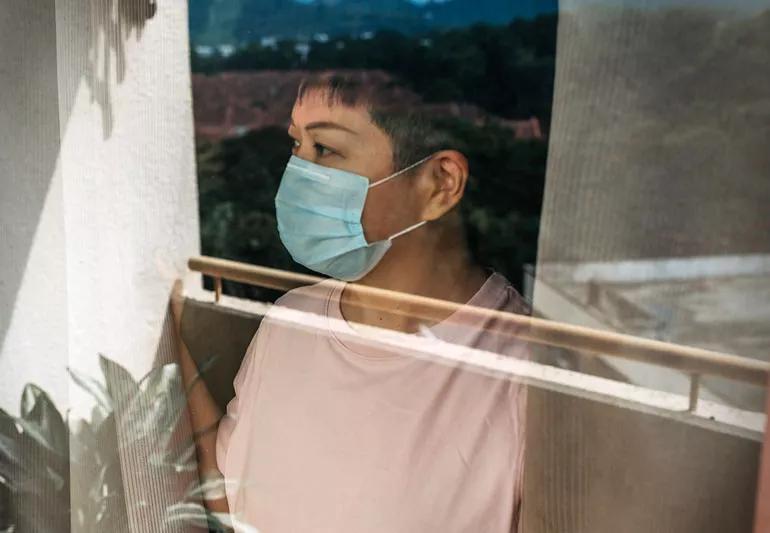The short answer from an infectious disease specialist

Image content: This image is available to view online.
View image online (https://assets.clevelandclinic.org/transform/6a12023e-58f2-4801-9c08-45bbfe3c4bd8/covidQuarentine-1215673517-770x533-1_jpg)
woman looking out of window during self quarentine
This article was originally published on May 11, 2020. It was updated on December 15, 2020, to reflect new information about this rapidly evolving situation.
Advertisement
Cleveland Clinic is a non-profit academic medical center. Advertising on our site helps support our mission. We do not endorse non-Cleveland Clinic products or services. Policy
A: The answer depends on the degree of contact you have with that person.
The coronavirus mainly spreads from person to person through droplets when an infected person talks, coughs or sneezes. This means that the biggest risk for catching it is to be in close contact for a significant amount of time with someone who has COVID-19.
Close contact means that you were within 6 feet of someone for at least 15 minutes.
If you were just grocery shopping in the same store as someone who might have COVID-19 and everyone was wearing masks, that would not be considered a high risk — unless that person coughs or sneezes directly on you, which is a clear exposure.
People who do come in close contact with someone who has COVID-19 should self-quarantine for up to 14 days, or as instructed by your local public health department. This involves staying home and limiting your interactions with others — even if you don’t get sick. We now understand that people can have the virus and pass it on to others even if they aren’t showing any symptoms, so self-quarantining is critical to helping prevent the spread.
If you develop symptoms such as cough, fever or shortness of breath, contact your healthcare provider for guidance on what to do.
Advertisement
— Infectious disease specialist Kristin Englund, MD
Advertisement

Delivered every Tuesday!
Sign up for our Health Essentials emails for expert guidance on nutrition, fitness, sleep, skin care and more
It's a letter about the news!
Learn more about our editorial process.
Advertisement
The short answer: It’s complicated, but the basic care precautions still prevail, like washing your hands and isolating if you’re sick
They can feel like a typical headache or a migraine headache, but the pain can last for weeks to months
Any large social gathering — from a family birthday party to an indoor music concert — has the potential to spread serious infection
It’s important to connect with a healthcare provider, get quality sleep and balance your activities with your energy levels
Just like the flu, COVID-19 will continue to evolve every year
The duration varies, but symptoms can linger for a few days up to a couple weeks or more
Vaccination is best for prevention, but if you get sick with COVID-19, treatments are available
The virus lives best in humans, but it can last on hard surfaces, like doorknobs and railings
Type 2 diabetes isn’t inevitable with these dietary changes
Applying a hot or cold compress can help with pain
Pump up your iron intake with foods like tuna, tofu and turkey